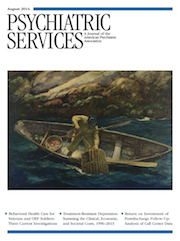The Role of Experienced and Anticipated Discrimination in the Lives of People With First-Episode Psychosis
Abstract
Objective
This study aimed to describe patterns of experienced and anticipated discrimination in a sample of persons experiencing a first episode of psychosis and to explore associations with clinical and psychosocial variables.
Methods
This cross-sectional survey was conducted within the context of the Psychosis Incident Cohort Outcome Study, a multisite naturalistic study examining first-episode patients treated in public psychiatric services in the Veneto Region of Italy. The Discrimination and Stigma Scale was used to assess experienced and anticipated discrimination.
Results
Ninety-seven patients were interviewed. Experiences of discrimination were common in relationships with family members (43%), making friends (32%), relationships with neighbors (25%), keeping a job (25%), finding a job (24%), and intimate relationships (23%). In regard to anticipated discrimination, 37% had stopped seeking a close relationship and 34% had stopped looking for work, 58% felt the need to conceal their diagnosis, and 37% reported that other people avoided them. In regression analysis, a higher number of functioning needs together with higher anticipated discrimination were associated with a higher level of experienced discrimination. A higher level of experienced discrimination and greater illness awareness were associated with more anticipated discrimination.
Conclusions
First-episode patients reported experiencing discrimination in several key life areas. Anticipated discrimination further limited their access to life opportunities. Patients’ awareness of the negative consequences of symptoms and disabilities led them to more easily perceive discrimination.



